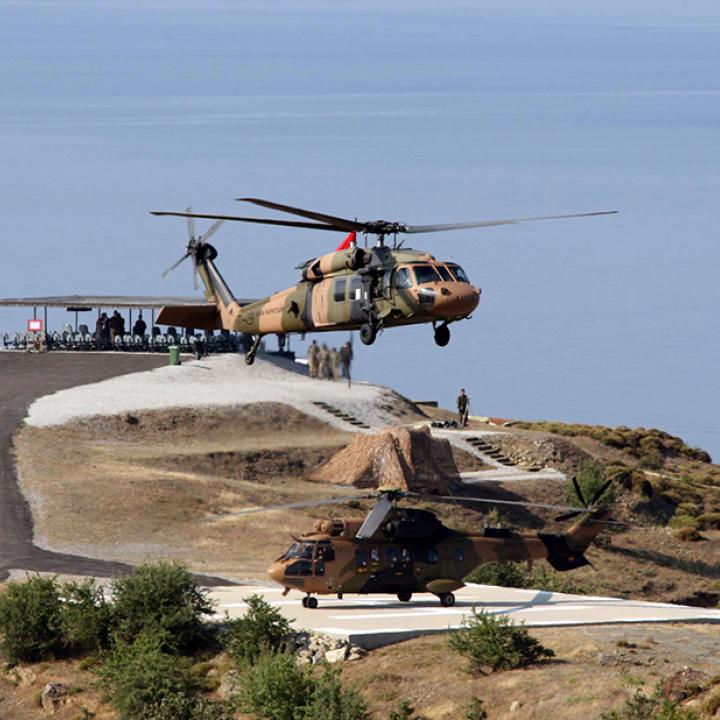
- Policy Analysis
- Fikra Forum
Turkey: Between Border Conflicts and Regional Expansion

Turkey has come to see the Iraqi city of Mosul as a representation of the geopolitical balance with other states in the region. The area Mosul is not only important for its size, population, and resources, but also for its location. Sitting on the border between Turkey and Syria, it is a key geographical, historical, cultural, and economic asset. Controlling it has become a goal for great powers hoping to expand their influence and exploit the area’s benefits. Iran, for example, seeks to disturb the balance of power in the region through its role in Mosul and the northern border regions. But Turkish decision-makers, in particular, are using Mosul as a theater for their regional and international aspirations: political, territorial, and economic expansion.
Turkey plays a confusing and contradictory role in Iraq as a whole, which is further complicated by its actions in and toward Syria. For example, in the aftermath of the 2012 protests, Turkey avoided labeling the al-Nusra Front and the Islamic State (Daesh) as terrorist groups for two main reasons. First, it has used these groups as tools to bring down the Syrian regime. In exchange, Turkey has allowed them to use Turkish territory as a refuge and a supply line, and Turkish intelligence services have supported them by turning a blind eye to fighters from around the world using Turkey to enter Syria. Second, Turkey has used these groups to fight Syrian Kurds. Turkey has a fear of the Kurdish cause both at home and abroad, and a complicated relationship with the Kurdish Regional Government in Iraq. It has found itself facing an autonomous region in northern Syria administered by the Democratic Union Party, a Syrian party close to the Kurdish Workers’ Party (PKK).
However, using terrorist organizations to one’s own advantage routinely backfires. After a period of strategic gains and political and economic strengthening, Turkey experienced domestic attacks by ISIS including the bombings of the Sultanahmet district, Istiklal Street, and Ataturk Airport. In addition, the tense disagreement between the Obama administration and Erdogan government over the latter’s support of terror groups forced Ankara to recognize that these were indeed terrorist organizations.
When preparations began for the battle to liberate Mosul, experts predicted that it would be relatively easy due to coordination between Iraqi forces, the Kurdish Peshmerga, and the international coalition, which planned an intense air campaign against Islamic State positions in the city.
But Turkey realized that this would not be in their interest because it would prevent it from using these terror groups for its own benefit. Turkey’s preemptive strike on Mosul shocked Iraq, but it reflected the importance Mosul has on shaping and establishing Turkish power in the region. Turkey did this for three primary reasons.
First, it wants to continue its strategy of soft war, taking advantage of its presence in Mosul to support certain domestic actors in Iraq and attempt to ensure a lasting Turkish presence there.
Second, Turkey wanted to exploit the issue of Mosul to keep Turkish public opinion focused outside Turkish borders. Turkey sought to tackle looming domestic issues after a failed coup attempt on July 15, 2016, most significantly by restructuring its military, security, justice and educational systems, and other important state institutions. This was a major challenge that took time and came on top of ongoing clashes with the PKK, which took advantage of the crisis to attempt to destabilize the government.
Finally, it wants to create an opportunity for direct confrontation with other regional powers in order to settle scores and continue its struggle safely away from its own territory. Erdogan hoped to send a message to the Turkish public that Turkey has a strong government capable of defending the interior and playing a leading role in the Middle East, inspired by memories of Ottoman power and the historical legacy of Mosul.
Turkish power also depends on a smart philosophy of economic expansion, through which the ruling elite can expand their control in the region. For example, Turkey has supported the Islamic State by buying their oil. Smugglers have found various ways of exporting oil from conflict areas, including tankers, small trucks, jerry cans carried by mules, temporary pipelines, and rafts across rivers. Most of the buyers are Turkish small business owners and transport companies who source crude oil in the Turkey-Iraq-Syria border triangle and transport it to Turkey, where intermediaries buy it for prices as low as $20 a barrel.
The aim of these economic ties between Turkey and terrorist groups is to exploit tense relations with the Iraqi government for political goals, including preventing the Kurds from obtaining national concessions in Iraq and Syria, which inflict a direct challenge to Turkey. Turkey exploits regional conflict to strengthen its relations with the Kurdish Regional Government in order to boost trade and investment in several sectors.
But the result of this – and Turkey’s other moves in Iraq – is that the Turkish-Iraqi border region has become an unstable Turkish vassal, where Turkey dominates both economically and politically. Turkey’s foreign relations are based on the principle that peace and justice are not achieved by diplomacy but rather through wars and conflict. It wages strategic campaigns through non-state actors, manipulating regional powers to win greater influence, and portrays itself as an interlocutor with multiple states and power centers across the region.


